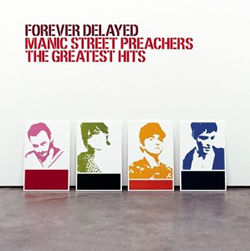Track listing:
- 1. A Design For Life
2. Motorcycle Emptiness
3. If You Tolerate This, Your Children Will Be Next
4. La Tristessa Durera
5. There By The Grace Of God
6. You Love Us
7. Australia
8. You Stole The Sun From My Heart
9. Kevin Carter
10. Tsunami
11. The Masses Against The Classes
12. From Despair To Where
13. Door To The River
14. Everything Must Go
15. Faster
16. Little Baby Nothing
17. Suicide Is Painless (Theme From M*A*S*H)
18. So Why So Sad
19. The Everlasting
20. Motown Junk
Manic Street Preachers. Greatest Hits. Once upon a long ago, the two would have been mutually exclusive. Around the time of 1992’s debut album Generation Terrorists, emboldened with youthful arrogance and a purity of ambition that wanted to rebel against the perceived traditional career-oriented notions of most acts, the band announced that they would not outstay their welcome with further releases. Play fast, shine brightly, quit young.
Such a plan, if ever really a serious one, was of course never seen through. For all their attitude and anti-establishment posturing (much of which was undeniably genuine), Manic Street Preachers have remained with us, becoming as much a fixture of the musical landscape as those they once considered themselves diametrically opposed to in ideological terms.
From inauspicious beginnings with a brace of largely ignored singles in 1990 and 1991, the Manics then found themselves on a major label (Epic/Sony) and – courtesy of some fine songs (Stay Beautiful, Little Baby Nothing, Motorcycle Emptiness) – on the brink of significant commercial success. Even so, few imagined the band would enjoy much longevity, and the mixed reception afforded to 1993’s second album Gold Against The Soul appeared to confirm such concerns. They continued to be perceived as outsiders, heading up an artistic cul-de-sac with their chosen brand of anthemic, impassioned post-punk rock.
1994’s The Holy Bible was desperately bleak and wilfully unconcerned with serving up chart-friendly material. Critics were impressed, but in truth the album’s reputation has been posthumous, brought into sharp focus and given perspective by events that would happen shortly after The Holy Bible’s release.
During the band’s early years, their spiritual leader was guitarist and lyricist Richie Edwards, always at the centre of some media controversy of other but beloved by fans and the “Inkies” end of music press spectrum. His sudden disappearance in late 1994, never to return, fuelled endless speculation over the possible reasons, and of the Mainc Street Preachers’ future without the troubled, mercurial Edwards. Surely they were finished?
Of course, things would never be the same, but if anything the adversity drove them on to greater heights. As the 90s wore on, British guitar music came back into fashion, and by happy accident the Manics emerged with their strongest album to date right at the very peak of Britpop’s all-consuming (if shortlived) ubiquity. Everything Must Go was a bruised but glorious reassertion of intent, acknowledging their loss but resolving to carry on. The sound was expansive, the choruses were huge and memorable, and a new era for the Manic Street Preachers had begun.
Consolidation seemed to the name of the game for 1998’s This Is My Truth, Tell Me Yours. Another clutch of magnificent singles were taken from it, but the album lacked the focus of its predecessor. From their position as respected major players, the Manics looked unassailable for the rest of the decade, yet in 2001 Know Your Enemy did its best to return them to the fringes.
So, in some respects Forever Delayed is ideally-timed to repair the band’s reputation. 18 singles, plus a brace of obligatory new recordings. All the biggest and best hits (including two UK #1s), but tellingly just one selection each from The Holy Bible and Know Your Enemy – and only two from Gold Against The Soul. Many will baulk at the presence of The Everlasting (which even the band loathe), and the omission of Roses In The Hospital, but Greatest Hits collections rarely please everyone – it’s best to judge what’s actually here.
The tracklisting opts for random chronology with an intelligent approach to running order. Forever Delayed kicks off with the towering A Design For Life, followed by the widescreen Motorcycle Emptiness, cautionary If You Tolerate This Your Children Will Be Next and underrated La Tristessa Durera from the period when Manic Street Preachers singles could expect merely a Top 30 placing at best. Quite some opening salvo.
While it’s arguable the second half of the album fails to quite match the magnificence of the first 10 selections, there are a few gems towards the end of Forever Delayed, such as The Holy Bible’s sole representative Faster and So Why So Sad; Know Your Enemy’s one truly excellent single.
Times and circumstances may have changed for Manic Street Preachers, yet their trademarks have not. Marxism, gauche lyrical conceits, a continual underlying rage that expresses itself in varying degrees of clarity. Be it 1992 or 2002, a Manics record is identifiably a Manics record. James Dean Bradfield‘s vocals doubtless play a part – quite what he’s singing is difficult to ascertain at times without the aid of a lyric sheet, and Richey Edwards/Nicky Wire‘s uncompromised prose plays havoc with meter and phrasing on several tracks, but nobody has ever sounded quite like Bradfield has done over the last 12 years of bringing the Manics’ worldview to life.
Whether one agrees with them or not, the legacy of Manic Street Preachers paased down through these songs is not to be scoffed at. Never the most immediately endearing or easily accessible British band, their original raw energy has been moulded into mature craftsmanship with no loss of integrity or blunting of their power to engage.
Review copyright © Liam Carey, 2002. E-mail Liam Carey
Reviewer of movies, videogames and music since 1994. Aortic valve operation survivor from the same year. Running DVDfever.co.uk since 2000. Nobel Peace Prize winner 2021.


